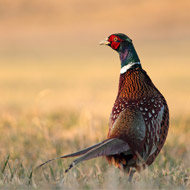Pheasant shooting on Welsh public land to end

A poll found that 75 per cent of the Welsh public believe that shooting birds should be made illegal.
Natural Resources Wales (NRW) has announced that it is to bring an end to pheasant shooting on Welsh public land.
In a statement, the Government-sponsored body said it ‘will not renew leases on its land for pheasant shooting rights when they come to an end in March 2019 as part of its final position statement on the use of firearms on land it manages.’
“We want to make the most of the land we manage for the people, economy and environment in Wales,” said NRW’s acting chair Madeleine Havard. “As a land manager, this means considering how best to make sure that we tackle the ongoing decline in our wildlife while conserving rare animals and habitats."
The decision follows a three-year campaign by Animal Aid and the League Against Cruel Sports (LACS), supported by more than 12,500 members of the public.
Earlier this year, Welsh environment minister Hannah Blythyn wrote to NRW stating how the administration does not support rearing, releasing and shooting game birds for sport on public land. Furthermore, a poll by the LACS in April found that 75 per cent of the Welsh public believe that shooting birds should be made illegal.
Welcoming the move, LACS senior public affairs officer Bethan Collins said: “Natural Resources Wales is to be commended in the strongest terms for ensuring pheasant shooting in the Welsh national forest is being brought to an end. This outcome reflects strong opposition to the practice from the Welsh Government, over 75 per cent of the public who oppose shooting birds for sport and an urgent need to reverse damage to wildlife and the environment on the public estate.
Animal Aid campaigns manager Fiona Pereira said: “We are delighted that NRW has banned the cruel shooting of pheasants on public land. The campaign has shown that the vast majority of people strongly oppose the killing of animals for “sport” and want to see an end to it.
“NRW can now use that land for positive activities that are kind to animals and to the environment, and, importantly, set an example for other public bodies that also want to bring about an end to the shooting of birds.”



 The Animal and Plant Health Agency (APHA) has updated its online reporting service for dead wild birds.
The Animal and Plant Health Agency (APHA) has updated its online reporting service for dead wild birds.